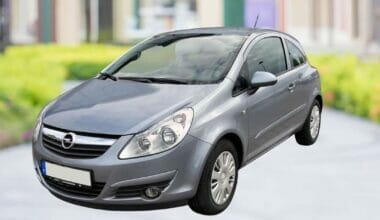If you are hearing a rattling noise from your Corsa D while accelerating, it could be due to several reasons. The most common reason is that your engine isn’t receiving the right amount of air/fuel mixture. It can also be caused by low fluids or a bad torque converter. The good news is that the noise usually goes away once you hit about 65mph.

GM engine rattling noise
There are several possible causes of the rattling noise you hear while accelerating your GM vehicle. One common problem is worn pistons. The noise usually goes away after the engine warms up. If this doesn’t solve your problem, you can replace your pistons with oversize ones. However, this is an expensive fix. In most cases, you will be able to live with the noise and won’t have to worry about any further issues.
Another cause of a rattling noise in your car is a damaged motor mount. When the motor mount ruptures, it will leak fluid everywhere, so make sure to check the motor mount on the passenger side of your vehicle. You should also look for dark lines of dripping oil.
Timing chain looseness
If your Corsa D is making a rattling noise when accelerating, there are several possible causes. One of them is a worn timing chain. The timing chain slides against a nylon guide and gradually begins to wear down. If the timing chain is too loose, it can snap off and cause a lot of damage. A tightening kit will help prevent this.
The noise can also be a result of a worn-out or damaged v-belt pulley. The rattling noise you hear will increase in volume as engine speed increases. In some cases, the noise will be present even at idle.
Exhaust pipe heat shields
If you have noticed a rattling noise when accelerating your car, it’s most likely because your exhaust pipe heat shields are failing. If they are faulty, they can cause vibration and cause rust damage. A rattling noise will be audible at low engine speeds and may change pitch as you increase speed. To fix this problem, contact a professional who can examine the heat shield.
There are several ways to repair heat shields that are faulty. Fortunately, it is not a complex or multi-day procedure. Some vehicles are more likely to experience heat shield rattle than others. This is because not all manufacturers use the same welding processes or materials. Therefore, rattling noises may be more common on older cars and lower-end models.
Low fluids
A common symptom of low fluids in your Corsa D is the rattling noise you hear while accelerating. This noise may come from your engine’s catalytic converter. This component is responsible for generating sparks that propel the car’s engine. When the catalytic converter fails, you can expect reduced performance and a higher fuel consumption. Other symptoms include excessive oil consumption and misfires.
The noise can also be caused by low transmission fluid. Changing your transmission fluid can prevent this symptom and improve the performance of your Corsa D. You should also check your car’s octane level. Lower octane fuel can degrade your engine’s performance and make the noise worse.
Incorrect air/fuel mixture
If your car makes a rattling noise when you accelerate, the problem is most likely in your engine. The rattling noise can occur during acceleration, idling, or cruising. To figure out what’s causing the noise, you can start by checking the transmission fluid level. Other likely culprits include the torque converter, heat shields, or pulleys.
The problem can also be caused by the wrong air/fuel mixture. The incorrect air/fuel mixture causes the engine to knock or ping when you accelerate. You can check this by looking at the owner’s manual. You can also try using a different fuel grade to fix the problem.
